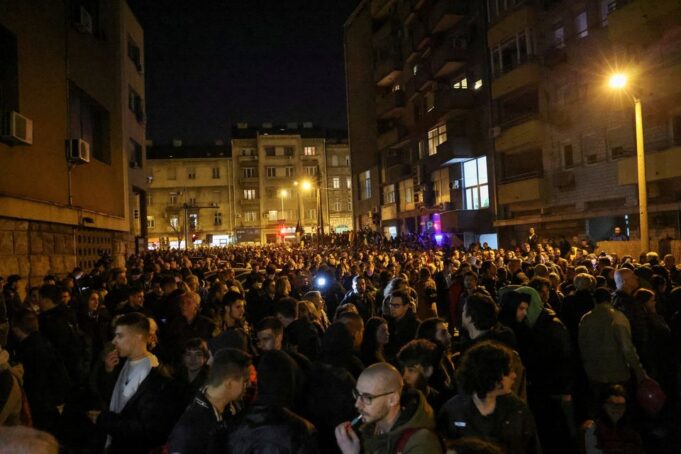Scores of people, on Monday, December 25, 2023, gathered in front of the central election commission building in Belgrade, the capital of Serbia, to protest over an election earlier this month that international monitors said was unfair.
The protesters marched to the main police station where they believed those detained by police were being held.
Earlier in the day, police said 38 people had been detained during and after an opposition protest over election results on Sunday. The police said eight policemen were injured in clashes.
Protesters on Sunday broke windows and glass at the main entrance of the town hall, before police used pepper spray to disperse them around 10 p.m. (2100 GMT).
Ivica Ivkovic, head of the police administration, said two of the eight wounded policemen sustained serious injuries.
“We will continue to work to maintain peace and order and we expect to see more arrests in relation to protests last night,” Ivkovic told Reuters.
READ ALSO: 8 die, 13 wounded in Serbia mass shooting
Serbia’s ally Russia said foreign-backed forces were trying to foment trouble.
“There are processes and attempts by third forces, including from abroad, to provoke such unrest in Belgrade. We have no doubt that the leadership of the republic will ensure the rule of law,” Kremlin spokesman, Dmitry Peskov, said.
The opposition parties accused police of excessive force, and some social networks showed footage of policemen beating up men in streets near the town hall.
Outgoing Prime Minister, Ana Brnabic, thanked the Russian secret service for providing information on planned activities by the opposition.
“This (my statement) is not going to be popular in the West,” Brnabic, of the ruling Serbian Progressive Party (SNS), said on Serbian television.
A European Union aspirant, Serbia has resisted pressure by Western countries to introduce sanctions against Russia.
Moscow has been one of Serbia’s closest allies for decades, especially after 1999 when Russia opposed the NATO airstrikes against rump Yugoslavia that comprised Serbia and Montenegro.
An international monitoring mission last Monday said the SNS gained an unfair advantage through media bias, the improper influence of President Aleksandar Vucic, and voting irregularities such as vote buying.
Serbian authorities deny any irregularities.
The populist ruling Serbian Progressive Party (SNS) won 46.72 per cent of the votes in the December 17 snap parliamentary election, according to state election commission preliminary results.
Serbia Against Violence came second in the election with 23.56 per cent of the vote, and the Socialist Party of Serbia third with 6.56 per cent.










